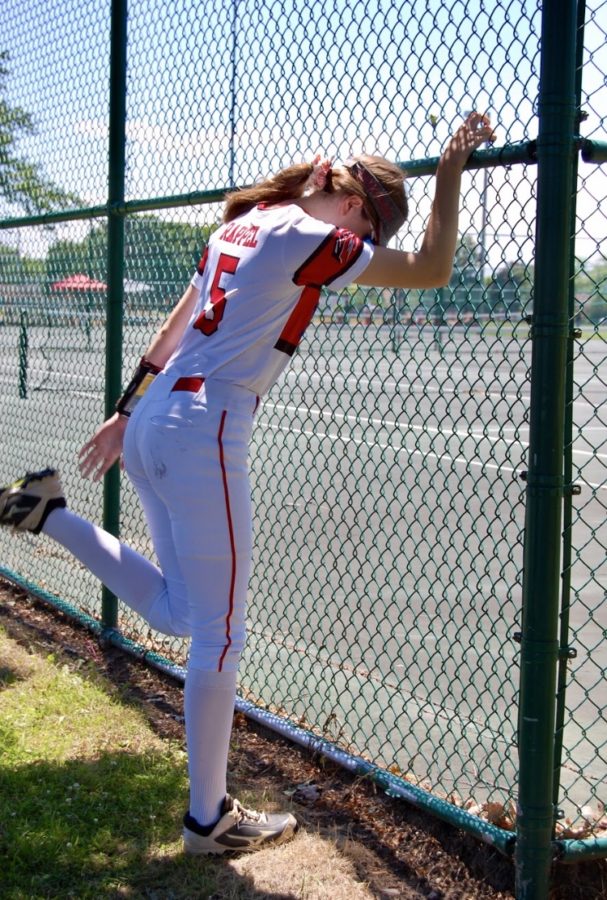The invisible battle: My experience recovering from a major injury
Dealing with a major injury as an athlete is incredibly challenging at any time. Dealing with a major injury as an athlete during the COVID-19 pandemic, however, is truly a battle.
As a softball player, I’ve had my fair share of injuries: sprained fingers and elbows, sore muscles and even a hairline fracture. However, I have never experienced anything quite like my injury last June. During one of my first tournaments of the summer, I pulled my quad, and it put me out for virtually the entire season.
When I was injured, I faced a number of unique challenges due to the pandemic. It was really unfortunate timing; I had already lost three months of high school softball to the pandemic, and my injury robbed me of three more months of practice and competition.
On top of that, my team was short players at the time. In my determination to play and help out my team, I put off treating my injury longer than I should have.
And finally, of course, there was the difficulty of physical therapy. Going through strenuous training to rehabilitate a muscle is even harder when you’re wearing a mask in a stuffy indoor facility.
The most challenging part of recovery, however, was not the physical hardship or the poor timing. In my experience, recovering from my injury mentally was a challenge like no other.
For most of the summer, I felt like I was fighting a losing battle. My injury was invisible, and there was no timeline for recovery. I tried to play again many times only to find that I wasn’t as healed as I thought. Oftentimes, the physical ache of frustration and disappointment in my chest hurt more unbearably than my leg.
Even when my physical therapist cleared me to play again, my struggle was not over. The thought of reinjury terrified me to the point where I physically couldn’t bring myself to run to my full potential. I found myself moving up to an extremely competitive 18U A-level league when I hadn’t played for six months and was constantly battling a mental injury that seemed even more insurmountable than my physical one.
The ghost of a player that I was over the summer haunted me. I couldn’t escape myself. I worried that I hadn’t stretched my leg enough. I worried that my muscles were too tight. I worried about running starting to hurt again. I worried about letting down my team. I worried and worried and worried.
My anxiety consumed me, a unique and particularly pernicious juxtaposition of overflowing distress and eerie emotional hollowness. It affected my performance. My coaches, teammates and parents were supportive, but I could tell that the way I was playing wasn’t enough.
When I approached my physical therapist with my concerns, he told me that I had to help myself. He could tell me that I was physically ready to play again, but I had to figure out how to get there mentally on my own. He asked me: “Why do you want to get better?”
My response was immediate: “This is going to be my last season, and I want to make the most of it.”
It was a simple answer, no grand revelation. But saying it aloud forced me to internalize that if I kept playing afraid, the ultimate culmination of my career would be another season of disappointment. This was it. If I was going to play halfway, I might as well not play at all. Besides, the threat of injury had always been there even before I pulled my quad, and I had chosen to play despite it for years. What was stopping me from doing it now, when I had so much to play for?
That day, I truly ran for the first time in months. And I didn’t stop running.
I came back to lead my team in OPS (on-base plus slugging: a statistic that measures a hitter’s success) last fall against some of the best competition I’ve ever seen. I hit as many home runs in a couple of months as I did in my entire softball career. I exceeded everyone’s expectations, including my own. Finally, I felt like I had beaten my injury.
I don’t pretend that my athletic life is perfect now. I’ve changed as a player in ways both good and bad. I still worry about my leg a lot. I stretch religiously before every workout, practice and game. I even spent the first week of varsity softball going to the trainer because I was worried I had hurt it again.
Honestly, I don’t think the ghost of that summer will ever completely stop haunting me. But still, I choose to face my fear head-on and play despite my anxieties, because if sports have taught me anything, it’s that letting fear limit you is no way to live.
The day I finally hang up my cleats for good, I will do so knowing that by choosing to play in spite of my worries, I am victorious.
Your donations directly fund the Lane Tech student journalism program—covering essential costs like website hosting and technology not supported by our school or district. Your generosity empowers our student reporters to investigate, write, and publish impactful stories that matter to our school community.
This website is more than a publishing platform—it's an archive, a research tool, and a source of truth. Every dollar helps us preserve and grow this resource so future students can learn from and build on the work being done today.
Thank you for supporting the next generation of journalists at Lane Tech College Prep!

Ella, a senior, is enjoying her first year with The Champion. An avid reader and writer, Ella spends much of her time with her head stuck in a book or...

